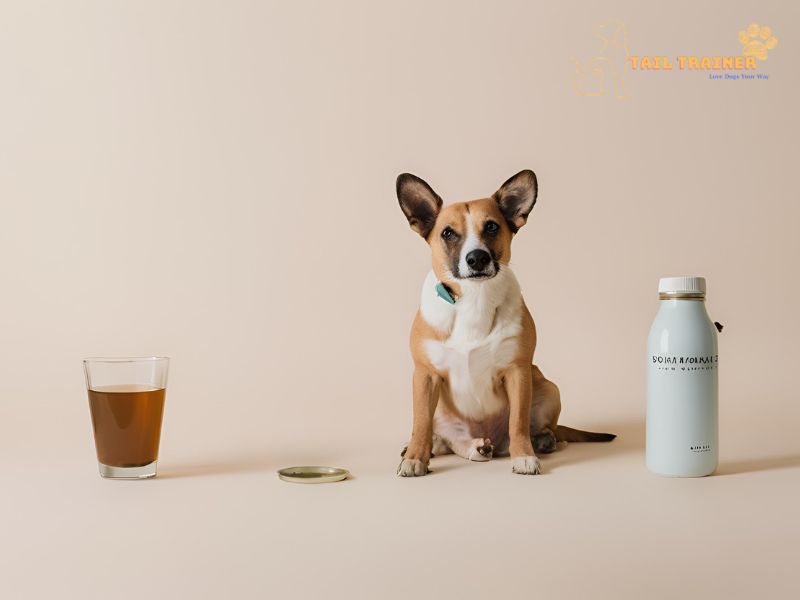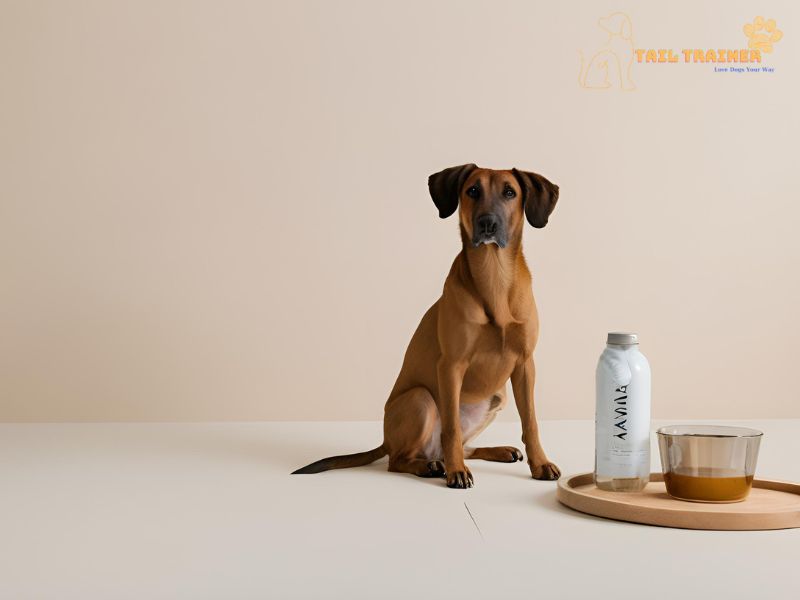Dogs need adequate hydration to stay healthy, but plain water isn’t their only option. Understanding what else dogs can drink other than water is crucial for their overall wellness. At Tail Trainer, we’ve explored various safe, nutritious beverages that can be occasional alternatives. Read on to discover which drinks are good for dogs, how to serve them, and the precautions you need to take.
Key Takeaways
What else can dogs drink other than water?
Dogs can safely drink diluted bone broth, coconut water, and certain fruit juices as occasional alternatives. These drinks offer extra hydration and nutrients but should be served in moderation. Always consult a veterinarian before adding new beverages to your dog’s diet.
Safe Drink Options for Dogs Besides Water

When considering alternatives to water, it’s essential to understand what fluids can benefit your dog’s health without causing harm. Some drinks offer additional nutrients, while others provide a treat-like experience.
Bone Broth as a Hydrating Option
Bone broth is a flavorful option that many dogs enjoy. It’s made by simmering bones and connective tissues, releasing nutrients like collagen, glucosamine, and minerals. This drink not only helps with hydration but also supports joint health and digestion.
- How to Serve: Ensure it’s homemade or store-bought without onions, garlic, or excess salt, as these ingredients can be harmful to dogs.
- Benefits: Rich in amino acids, gelatin, and nutrients, making it great for joint health and gut repair.
- Precautions: Avoid serving it hot. Dilute it with water to reduce the sodium content, as too much salt can cause dehydration.
If you’re interested in learning more about how to improve your dog’s overall health and behavior, consider signing up for our Dog Training Course.
Coconut Water for Electrolytes
Coconut water is packed with electrolytes like potassium, making it a good choice after physical activity or on a hot day. It’s a natural way to help your dog stay hydrated, especially if they’ve been particularly active.
- How to Serve: Offer a small amount to see how your dog responds. Serve it chilled for a refreshing effect.
- Benefits: Contains antioxidants and can help maintain a healthy balance of electrolytes, particularly after exercise.
- Precautions: Avoid sweetened or flavored versions, as added sugars can be harmful to dogs.
Dog-Friendly Herbal Teas
Certain herbal teas, like chamomile or rooibos, can be beneficial for dogs. They can have calming properties and aid in digestion.
- How to Serve: Brew the tea, let it cool, and dilute it with water before offering it to your dog.
- Benefits: Chamomile helps with relaxation, while rooibos contains antioxidants that support overall health.
- Precautions: Avoid teas with caffeine or herbs that are toxic to dogs, such as peppermint or green tea.
Other Beneficial Drinks for Dogs
Besides water, dogs can benefit from other liquids that are nutrient-dense and safe when given in moderation. Here are some additional options:
Vegetable Juices for Nutrients
Freshly juiced vegetables like carrots or cucumbers can offer hydration along with vitamins and minerals. These juices can be a source of vitamin A and other nutrients that support your dog’s immune system.
- How to Serve: Juice the vegetables without adding any seasonings or salt, and dilute the juice with water.
- Benefits: Provides hydration with added nutrients that benefit vision, skin, and immune health.
- Precautions: Avoid juices made from onions, garlic, or other toxic vegetables.
Plain Kefir for Gut Health
Kefir, a fermented milk drink, is full of probiotics that support gut health. It can be especially helpful for dogs with digestive issues or after a course of antibiotics.
- How to Serve: Start with small amounts to see how your dog reacts. Choose plain, unsweetened kefir without added flavors or sweeteners.
- Benefits: The probiotics in kefir promote a balanced gut microbiome, improving digestion and immune function.
- Precautions: Lactose-intolerant dogs may not tolerate it well, so monitor your dog’s reaction.
Fruit Juices (in Moderation)
Dogs can safely drink diluted fruit juices like apple or blueberry juice. These juices should be made from whole fruits without added sugars.
- How to Serve: Dilute with water at a 1:1 ratio to reduce sugar content and make it less sweet.
- Benefits: Rich in vitamins and antioxidants, promoting overall health and immune support.
- Precautions: Serve only a small amount occasionally, as too much fruit juice can cause diarrhea or upset stomach.
Drinks to Avoid for Dogs

While some drinks can be beneficial, others are not suitable for dogs and should be avoided entirely.
Dairy Products
Most dogs are lactose intolerant, making dairy products like milk a risky choice. Consuming dairy can lead to upset stomachs, gas, and diarrhea.
- Why to Avoid: Many dogs cannot digest lactose, the sugar found in milk, leading to gastrointestinal issues.
Alcohol and Caffeinated Beverages
Alcohol and caffeinated drinks are extremely dangerous for dogs. Even a small amount can cause severe health problems.
- Why to Avoid: Both alcohol and caffeine can cause symptoms like restlessness, rapid heart rate, seizures, and in extreme cases, death.
Sugary or Artificially Sweetened Drinks
Drinks containing artificial sweeteners, particularly xylitol, are toxic to dogs and should be kept away from them.
- Why to Avoid: Xylitol causes a rapid release of insulin, which can lead to dangerously low blood sugar levels.
How to Safely Introduce New Drinks to Your Dog

If you’re planning to introduce a new drink to your dog’s diet, do so gradually to avoid digestive upset or allergic reactions.
Start Slow
Begin by offering a small amount of the new drink, mixed with water. This allows you to observe your dog’s reaction and tolerance.
Monitor Your Dog’s Health
Keep an eye out for any signs of discomfort, such as diarrhea, vomiting, or lethargy. If these occur, stop offering the drink and consult your vet.
Consult Your Vet
Always consult with your veterinarian before making any changes to your dog’s diet, including introducing new drinks. They can provide guidance based on your dog’s specific needs and health status.
Frequently Asked Questions (FAQs)
1. Can dogs drink milk instead of water?
Most dogs are lactose intolerant, making milk a poor substitute for water. Milk can cause digestive upset, including diarrhea and gas. Always offer plain water as the main source of hydration.
2. Is coconut water safe for dogs?
Yes, coconut water is generally safe for dogs when served in moderation. It contains electrolytes that can help keep dogs hydrated, especially after exercise. However, ensure it’s unsweetened and free of additives.
3. Are fruit juices good for dogs?
Dogs can have diluted fruit juices like apple or blueberry juice occasionally. Always dilute the juice and serve in small quantities to prevent digestive upset from the sugar content.
4. What are the benefits of bone broth for dogs?
Bone broth is rich in nutrients like collagen, amino acids, and minerals, which support joint health, gut repair, and hydration. Make sure to use a low-sodium version free of onions and garlic.
5. How can I ensure my dog stays hydrated during summer?
Provide plenty of fresh water throughout the day, offer ice cubes as a treat, and consider giving small amounts of dog-safe drinks like diluted coconut water or bone broth for added hydration.
For more expert tips on dog training, nutrition, and health, visit Tail Trainer regularly. We provide insights to help you raise a healthy, happy dog.
